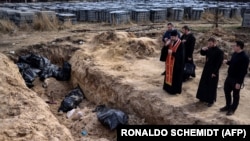The United Nations voted on April 7 to suspend Russia from the world body’s Human Rights Council for the apparent atrocities by Russia’s troops in Ukraine.
Meantime, the State Duma, or lower chamber of Russia’s parliament, is moving to turn the tables with a proposed law that would officially recognize “the genocide of ethnic Russians” by Ukraine – a myth that’s been widely debunked.
Still, a law would perpetuate this long-running line of Kremlin disinformation meant to demonize Ukrainians. It would also solidify Russian President Vladimir Putin’s excuses for the war, give the Russia another tool to criminally prosecute those who oppose the war and further suppress independent news media.
The ultra-nationalist Liberal Democratic Party of Russia (LDPR) proposed the genocide legislation on April 4, the same day the world learned about a large number of civilian deaths in Bucha, a Kyiv suburb that Russian forces abandoned.
Ukrainian forces and journalists reportedly found hundreds of corpses, some with signs of torture and execution or piled into mass graves. Russia denied its troops were involved and instead tried to blame Ukrainian security forces for what Western leaders and Ukraine President Volodymyr Zeleneskyy called war crimes.
The LDPR-sponsored legislation states that, “Ukraine has been committing the crime of genocide against the Russian population for eight years.”
The bill accuses the Ukrainian government of having taken steps beginning in 2014 toward the “physical destruction of the inhabitants” of the Donetsk and Luhansk “people’s republics” in eastern Ukraine’s Donbas region, contending that “the vast majority” of the residents of those Russia-backed separatist enclaves “belong to the Russian ethnographic group.”
“Genocide of the Russian population is not limited to the Donetsk and Luhansk People’s Republics,” it states.
The claim of genocide is false, and the implication that Donetsk and Luhansk are Russian and not Ukrainian is an exaggeration.
The legislation itself does not provide material evidence of the “genocide.” But its language misrepresents the United Nations’ statistics of casualties after the eight years of war in Donbas, as if these numbers mostly reflect mostly harm to the ethnic Russian population. Such interpretation is simply not true – in fact, the U.N. reports, cited in the bill, do not refer to the ethnicity of the casualties.
There’s no doubt there were many in the war, which began after Russia illegally and forcefully annexed Ukraine’s Crimean Peninsula in 2014.
A month before the latest invasion began on February 24, the United Nations Office of Human Rights (OHCHR) reported the following statistics (notably without ethnic reference):
“OHCHR estimates the total number of conflict-related casualties in Ukraine from 14 April 2014 to 31 December 2021 to be 51,000–54,0008: 14,200-14,400 killed (at least 3,404 civilians, estimated 4,400 Ukrainian forces, and estimated 6,500 members of armed groups), and 37-39,000 injured (7,000–9,000 civilians, 13,800–14,200 Ukrainian forces and 15,800-16,200 members of armed groups).”
Moreover, after analyzing the proposed bill, the Russian Duma’s own legal department rejected its characterization of “genocide” as “incorrect,” saying that under United Nations conventions, “the classification of any actions as genocide could only be done by a competent court.”
Over the years, Russian politicians, Russia-backed separatists and Russian state media have repeatedly made false claims of aggression by Ukraine. In fact, Russia instigated the war in Donbas virtually in tandem with the Crimea takeover.
Russia then fed that conflict, providing military supplies and personnel – facts ignored by the proposed Duma law. A Russian missile system was implicated in the 2014 shoot down of a Malaysian airliner over Donbas, killing 298 aboard. The Kremlin made up multiple fake explanations and impeded efforts to investigate.
Language in the Duma legislation attempts to pin blame solely on Ukraine for the deaths, casualties and displacement caused during the war in Donbas. Problem is, not only did Russia initiate and sustain the fighting, it has now expanded to an all-out war, attacking the capital of Kyiv and major cities outside Donbas, with an apparent strategy of targeting and terrorizing the civilian population.
Casualty counts since Russia’s February invasion are unreliable given the ongoing fighting. The U.N. says more than 1,600 civilians, including 130 children, have died and another 2,300 have been injured.
Ukraine says civilian casualties are far higher, and that hundreds died in Bucha and around Kyiv. The United States has estimated between 7,000 and 15,000 Russian troops deaths, while Ukraine has said it lost more than 1,300.
On February 27, more than 300 scholars of genocide published a joint statement denouncing Russia’s claims against Ukraine, including President Vladimir Putin’s aim of “de-nazification,” as “cynical abuse of the term genocide” to “justify its unprovoked aggression”:
“Russian propaganda has painted the Ukrainian state as Nazi and fascist ever since Russian special forces first entered Ukraine in 2014, annexing the Crimea and fomenting the conflict in the Donbas, which has smoldered for eight long years. It was propaganda in 2014. It remains propaganda today…”
“This rhetoric is factually wrong, morally repugnant and deeply offensive to the memory of millions of victims of Nazism and those who courageously fought against it, including Russian and Ukrainian soldiers of the (Soviet) Red Army.”





